Symposium overview
The in-person event was co-chaired by Dr Prasad Ram and Umezuruike Linus Opara and took place over two days with networking opportunities, receptions, and dinners. From boosting hazard resilience to providing basic services such as energy and water, engineering and technology can contribute to solving the world’s most pressing development challenges. To achieve this, research must be collaborative, cross-disciplinary, and question the status quo. Technology and agriculture go hand-in-hand.
Technology can improve agricultural practices in low- and middle-income countries (LMICs), for instance, by improving precision farming and contributing to greater automation. On top of this, data collection can help make informed decisions and improve educational outcomes. This report summarises the key insights from the discussions and activities that took place at the symposium.

“I go to many great conferences but at Frontiers of Engineering for Development your mind is continuously being expanded with every conversation."
Dr Prasad Ram, Symposia Chair
Chairs
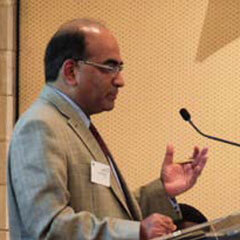
Dr Prasad Ram, Founder and CEO of Gooru
Prasad started Gooru as a non-profit in 2011 whilst at Google. The aim was to bring the simplicity of Google Maps to education by developing a ‘GPS for Learning’. For each topic, students are presented with a learning ‘route’ based on their profile and are continuously ‘re-routed’ based on their performance. Dr Ram is a Council Member and Chair of the Education Committee at the California Council of Science and Technology (CCST) and is also a Board member at Leadership Public Schools (LPS). He also holds a PhD in computer science from UCLA, and a BTech in computer science from the Indian Institute of Technology-Bombay, India
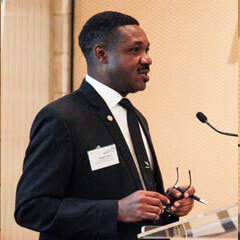
Professor Umezuruike Linus Opara, President of the Pan-African Society for Agricultural Engineers
Professor Opara is a Distinguished Professor at Stellenbosch University, South Africa, where he also holds the DST-NRF South African Research Chair in Postharvest Technology. He graduated with degrees in agricultural engineering from the University of Nigeria, Nsukka, and Massey University, New Zealand. He has held academic and management positions in New Zealand, the Sultanate of Oman, and South Africa, and has consulted with international development agencies such as the Food and Agriculture Organisation (FAO) of the United Nations. He is the founding President of the Pan-African Society for Agricultural Engineering.
Sessions and speakers
Agriculture
The session focused on agriculture and how technology and engineering can help improve agricultural practices in developing countries. Speakers explored how technology can improve precision farming, lead to greater automation, and help improve farming practices and systems more broadly.
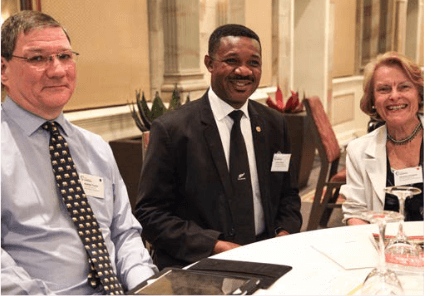
You are all agricultural engineers; you just don't know it!
Alastair Taylor
Presentations
Automation and precision farming in LMICs
Kit Franklin, Harper Adams University
In his presentation, Kit Franklin explored the concept of precision farming. In particular, he addressed the impact that this technique of farming – as well as greater automation – could have on the agriculture sector in developing countries. Kit unpacked this idea using the example of his project, the ‘Hands Free Hectare’, which enabled autonomous planting and harvesting of cereal crops. He also touched on the barriers that need to be addressed to achieve this.
Applying engineering and technology solutions to improve farming practices
Brendan Moroso, CGIAR Big Data
In his presentation, Brendan Moroso asked how engineering and technology solutions can be applied to build the infrastructure necessary to collect and store information and data. In
addition, he explored how this data can then in turn support better farming practices and
improved autonomous systems.
Harnessing engineering and technology disciplines to improve sub-Saharan farming systems
Taita Ngetich, Illuminum Greenhouses
In his presentation, Taita Ngetich explored ways to improve farming systems in sub-Saharan Africa. In particular, he focused on how engineering and technology can be harnessed to improve the efficiency of horizontal integration
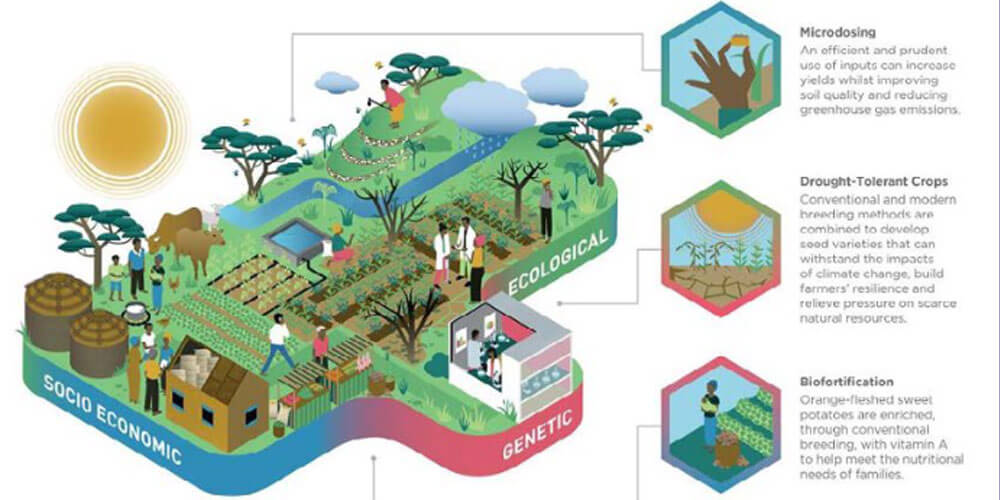
Realising ‘sustainable intensification’ while maintaining natural capital
Anh Tran, Coventry University
In her presentation, Anh Tran spoke about the concept of ‘sustainable intensification.’ More
specifically, she unpacked how this concept can be realised through engineering and technological solutions while also upholding the natural capital of countries.
Big Data Infrastructure
The second session was all about big data infrastructure, and how data can be used to ‘feed the world’ and achieve development goals.
From ‘geovisualisation’ maps to algae alerting systems, speakers introduced new and innovative technologies that are being used all over the world to improve sustainable agriculture.
Presentations
Feeding the big data demon to feed the world
Nishanth Sastry, King’s College London
Collecting and using data is an integral part of solving the world’s challenges, but it’s not that simple, according to Nishanth Sastry. In his presentation, Nishanth drew on his experience working on BBC’s iPlayer data to outline his vision agricultural transformation in LMICs using techniques like large image-based datasets, A/B testing, and randomised controlled trials.
Geographic data: Making the information available and usable
Serena Coetzee, Centre for Geoinformation Science, University of Pretoria
In her presentation, Serena Coetzee explained that the availability and usability of geographic information is essential for the wellbeing of society. In particular, ‘geovisualisations’ – also known as maps – can reveal patterns across regions. These spatial patterns, in turn, can help monitor and track geographical phenomena such as weather, soil quality, climate change, pests, and more. This can be seen in the maps used in the 1850s to track cholera cases across London. In a modern view, Serena described how cloud-based geovisualisation tools have the potential to make data more accessible.

The use of remote sensing, data analytics and spatial information systems to help reduce
environmental and economic loss in the aquaculture industry
Lee Annamalai, Meraka Institute
Aquaculture in South Africa – both wild and farmed – suffer losses due to the overgrowth of algae. But there’s a solution to this, according to Lee Annamalai. In his presentation, Lee introduced a new monitoring and altering system that was developed by the Council of Scientific and Industrial Research (CSIR). A system like this can help geo-locate these areas of overgrowth and predict their movements based on ocean models. The system also feeds into an interactive dashboard that is sent out to relevant stakeholders to help prevent or address algae overgrowth.
Big data challenges: Lessons from the Millennium Development Goals (MDGs)
Selma Karuaihe, University of Pretoria
Achieving the MDGs requires big data, but this is as simple as it sounds. In her presentation, Selma Karuaihe drew on her expertise as a consultant and country author for MDG7: Ensuring Environmental Sustainability. She noted that one of the biggest challenges to monitoring progress on the MDGs was gaining access to reliable big data that met international standards. Selma outlined three main challenges: first, using big data to locate data for all the sub-targets of MDG 7; second, using big data to curate a solution that fits international standards; and third, using big data to mediate between the problem and available solution in a way that makes it useful to local, national, and multinational stakeholders.
Education and learning for participation in the knowledge economy
In this session, Shalini Urs set the scene by defining ‘knowledge economy’ through
four pillars: innovation systems; education and training; information infrastructure and economic incentives; and institutional regime. This was then further explored by Professor Ifiok Otung, University of South Wales, and Dr Andrew McBride, University of Glasgow, with Dr Prasad Ram drawing on the digital learning platform ‘Gooru’ as a case study for discussion.Following this, round-table discussions were held with the participants and speakers
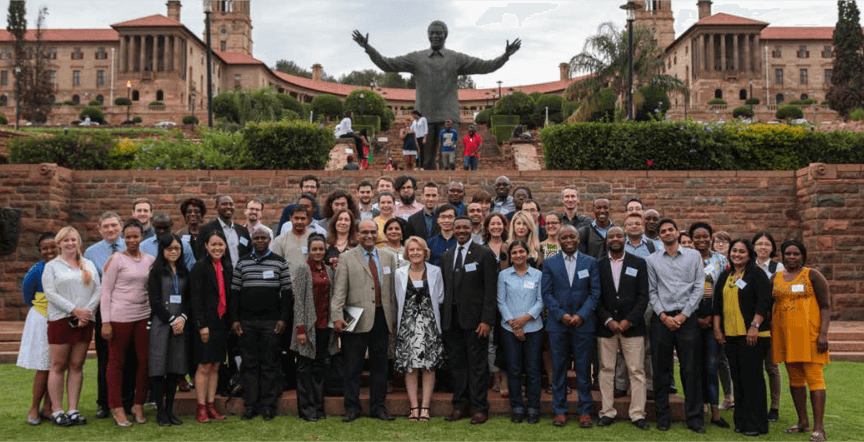
Participants xxxxxx at
Session summary:
During the round-table discussion, speakers and participants concluded that equal access to education results must be fostered – not just to resources. In addition, digital learning experiences must be complemented with offline activities. The reason being, that classroom instructional practices such as personalisation through real-time data can strongly contribute to learning outcomes. It is also important to go beyond the curriculum and develop non-cognitive skills, as this will help to secure stronger outcomes for students.Lastly, speakers and participants agreed that in terms of examinations, relying on multiple choice questions does not provide ‘quality of evidence’ that allows students to understand why answers are correct or incorrect.
Interested in the next Frontiers symposium?
Find out more about Frontiers, including eligibility below and @RAEngGlobal
